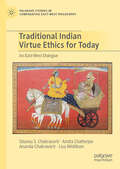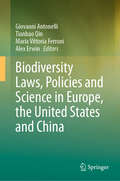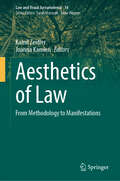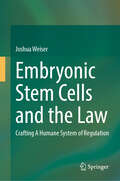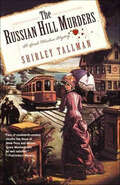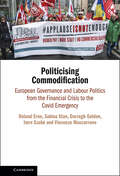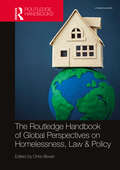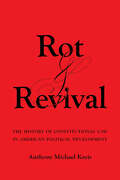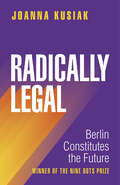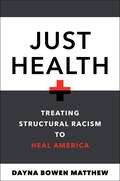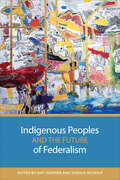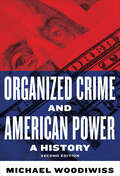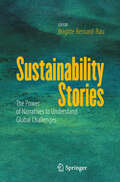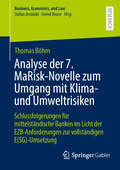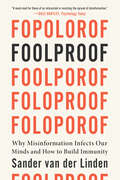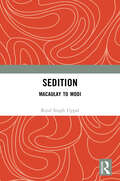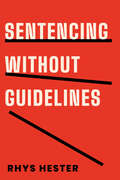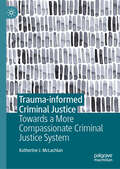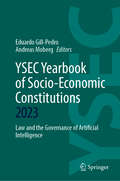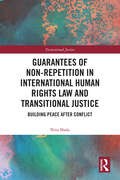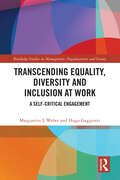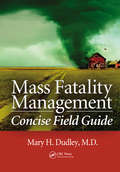- Table View
- List View
Under the Bridge: The True Story Of The Murder Of Reena Virk
by Rebecca Godfrey*Now a Hulu limited series starring Lily Gladstone, Riley Keough, and Archie Panjabi!* &“A swift, harrowing classic perfect for these unnerving times.&” —Jenny Offill, author of Dept. of Speculation One moonlit night, fourteen-year-old Reena Virk went to join friends at a party and never returned home. In this &“tour de force of crime reportage&” (Kirkus Reviews), acclaimed author Rebecca Godfrey takes us into the hidden world of the seven teenage girls—and boy—accused of a savage murder. As she follows the investigation and trials, Godfrey reveals the startling truth about the unlikely killers. Laced with lyricism and insight, Under the Bridge is an unforgettable look at a haunting modern tragedy.
Traditional Indian Virtue Ethics for Today: An East-West Dialogue (Palgrave Studies in Comparative East-West Philosophy)
by Amita Chatterjee Sitansu S. Chakravarti Ananda Chakravarti Lisa WiddisonWorking in the tradition of world philosophy, this book puts Western virtue ethics in conversation with traditional Indian philosophies. The book begins with a contribution from Michael Slote on ‘World Philosophy: The Importance of India,’ which is followed by contributions covering metaethical topics such as the relationship between Western virtue ethics and various Indian philosophical traditions, and applied topics such as environmental ethics, business ethics, ethics and science, and moral psychology. Contributors include scholars working in both North America and India.
Biodiversity Laws, Policies and Science in Europe, the United States and China
by Tianbao Qin Maria Vittoria Ferroni Giovanni Antonelli Alex ErwinThis book offers an in-depth analysis of and multidisciplinary insights into the latest trends in biodiversity laws, policies and science in Europe, the United States, and China. The loss of biodiversity and degradation of ecosystems continues at an alarming rate, harming people, the economy, and the climate. As biodiversity cannot be meaningfully addressed by any single field, a multidisciplinary approach is needed to attain a better understanding of its complexity and to identify prevention and protection systems. Each chapter addresses a specific aspect of biodiversity. Taken together, they provide an innovative exploration of the various facets of biodiversity from the perspectives of law, the social sciences and natural sciences. As such, the book offers an essential theoretical and practical guide for academics, experts, policymakers, and students alike.
Aesthetics of Law: From Methodology to Manifestations (Law and Visual Jurisprudence #14)
by Kamil Zeidler Joanna KamieńThe aesthetics of law deals with the relationship between law and beauty by searching for aesthetic values in the law itself (an internal perspective), by finding material related to law in art and culture (an external perspective), and, lastly, by demonstrating the impact of legal norms on what can be broadly understood as beauty (law as a tool of aestheticization). Regarding all these phenomena, the aesthetics of law ultimately allows us to see the law more clearly and more profoundly. What is more, the law does not function, nor has it ever functioned, separately from its means of expression, which are incontrovertibly subject to aesthetic interpretation. If we think about law in this way, perceiving not only the message, but also the manner in which it is conveyed, the whole set of means and tools used, the perfection and beauty of the form, then we will see art in it. After all, the widely known and still applicable ancient maxim ius est ars boni et aequi equates law and art. This alone should be an argument for aesthetic reflection on the law, a field of endeavour that should never have been abandoned. The book’s twenty-three chapters, written by scholars from various countries and three continents, are thematically diverse. In them we present the manifestations of the aesthetics of law from an external perspective. If we accept a definition of the concept of law that is as broad as possible, not only as a synonym of a certain formalized normative system, but also including the process of its creation (legislation), its application and interpretation (jurisprudence), and even teaching on and research into it (doctrine), we can identify a wealth of aesthetic references in the law. A broadly understood aesthetics of law, approached solely from an external perspective, covers such disciplines as law and literature, the aesthetics of legal rhetoric, the trial as performance, the aesthetics ofcourthouse architecture, law in the fine arts, law in film, law and music, pictorial law, symbols of the law and legal symbols, symbols of the state and power, legal archaeology etc. The field of research is, therefore, wide. In addition to topics traditionally and obviously associated with the aesthetics of law, such as law and literature, law in the fine arts, and court rhetoric, there are chapters on e.g. legal ethics and trademarks. All authors share the belief that beauty in law is important, even when it is hidden in a caricature. Further, they argue for restoring the aesthetics of law to its proper place in philosophical and legal discourse, as doing so would yield a host of benefits for the addressees of law.
Embryonic Stem Cells and the Law: Crafting A Humane System of Regulation
by Joshua WeiserThis book deals with the research and use of embryonic stem cells to combat a number of diseases and the legal limitations, arising mostly from bioethical concerns regarding human life. Using the New Haven problem and policy-oriented method of jurisprudence, the author thoroughly explains the scientific and technological parameters and promise of this medical innovation and its alternatives as well as the conflicting claims and past decisions regarding its legal and moral acceptability in international and comparative perspective. International law, EU and regional human rights law, as well as individual countries’ laws across the globe are covered, ending with American law on the federal and state levels. The book concludes with a recommendation of humane regulation, and a draft federal statute as a model form of regulation that would allow the beneficial research and use of this technology.
The Russian Hill Murders: A Sarah Woolson Mystery (Sarah Woolson Mysteries #2)
by Shirley TallmanThough her own San Francisco law firm barely tolerates her, gutsy young attorney Sarah Woolson flouts proper feminine behavior in this nineteenth-century answer to Legally Blonde. While her mother begs her to settle down, her chauvinistic boss tries to come up with ever more spiteful ways to pressure his only female associate into quitting. Naturally, Sarah digs in her heels and vows to retain her position at any cost. Besides, she has no intention of straying too far from the action.When the wife of wealthy society entrepreneur Leonard Godfrey drops dead of an apparent heart attack at a charity dinner for the new Women and Children's Hospital, Sarah's curiosity gets the better of her. But no one will believe in her theory that Caroline Godfrey's death was not natural---until several more people affiliated with the hospital die of inexplicable causes.Meanwhile, when a pregnant widow whose husband has died in a sweatshop fire asks for Sarah's help in finding the owner so that she can sue for recompense, our feisty heroine insists on taking the case against her boss's orders. With the help of her colleague Robert Campbell and an eager young hansom cabdriver named Eddie, Sarah goes on a manhunt for Killy Doyle, the menacing head of the factory underworld. But she can't ignore the mysterious deaths at the Women and Children's Hospital---especially when the hospital's Chinese chef is arrested for the murders and the Chinese community's most powerful Tong Lord asks her to defend him.Faced with her first criminal trial, Sarah stops at nothing to determine the killer's identity. But in trying to exonerate her client, she places her own life in danger. Will Sarah figure out who the murderer is, or will she be the final victim?
Politicising Commodification: European Governance and Labour Politics from the Financial Crisis to the Covid Emergency
by null Roland Erne null Sabina Stan null Darragh Golden null Imre Szabó null Vincenzo MaccarroneThis book examines the new economic governance (NEG) regime that the EU adopted after 2008. Its novel research design captures the supranational formulation of NEG prescriptions and their uneven deployment across countries (Germany, Italy, Ireland, Romania), policy areas (employment relations, public services), and sectors (transport, water, healthcare). NEG led to a much more vertical mode of EU integration, and its commodification agenda unleashed a plethora of union and social-movement protests, including transnationally. The book presents findings that are crucial for the prospects of European democracy, as labour politics is essential in framing the struggles about the direction of NEG along a commodification–decommodification axis rather than a national–EU axis. To shed light on corresponding processes at EU level, it upscales insights on the historical role that labour movements have played in the development of democracy and welfare states. This title is also available as Open Access on Cambridge Core.
The Routledge Handbook of Global Perspectives on Homelessness, Law & Policy
by Chris BevanThis handbook provides a comprehensive global survey and assessment of the law and policy relating to homelessness prevention. Homelessness is regarded internationally as one of the most pressing issues facing humanity and one of the greatest social challenges of our times. This has been further amplified as a result of the Covid-19 pandemic. Across the globe, there is an enormous divergence in both experiences of and responses to homelessness from governments and state actors. This handbook examines how different jurisdictions from across all five continents of the world have encountered, framed and responded to homelessness. Written by expert scholars and leaders in their field, the book engages in a multidisciplinary and comparative analysis of homelessness as an issue of acute social concern. Understandings of homelessness are geographically, culturally and historically situated, making analysis of each jurisdiction’s approach by a national expert deeply insightful. The collection examines legal and extra-legal policy interventions targeted at reducing or preventing homelessness from across the globe. Drawing on diverse perspectives, differing cultures and welfare regimes, it thus constitutes a timely evaluation of current approaches to homelessness internationally. This book will appeal to students and scholars of homelessness, sociology, social policy, anthropology, and urban sociology, as well as international and national policymakers.
Rot and Revival: The History of Constitutional Law in American Political Development
by Anthony Michael KreisRot and Revival is one of the first scholarly works to comprehensively theorize and document how politics make American constitutional law and how the courts affect the path of partisan politics. Rejecting the idea that the Constitution's significance and interpretation can be divorced from contemporary political realities, Anthony Michael Kreis explains how American constitutional law reflects the ideological commitments of dominant political coalitions, the consequences of major public policy choices, and the influences of intervening social movements. Drawing on rich historical research and political science methodologies, Kreis convincingly demonstrates that the courts have never been—and cannot be—institutions lying outside the currents of national politics.
Radically Legal: Berlin Constitutes the Future
by null Joanna KusiakRight in the middle of the German constitution, a group of ordinary citizens discovers a forgotten clause that allows them to take 240,000 homes back from multi-billion corporations. In this work of creative non-fiction, scholar-activist and Nine Dots Prize winner Joanna Kusiak tells the story of a grassroots movement that convinced a million Berliners to pop the speculative housing bubble. She offers a vision of urban housing as democratically held commons, legally managed by a radically new institutional model that works through democratic conflicts. Moving between interdisciplinary analysis and her own personal story, Kusiak connects the dots between the past and the present, the local and the global, and shows the potential of radically legal politics as a means of strengthening our democracies and reviving the rule of law. This title is also available as Open Access on Cambridge Core.
Just Health: Treating Structural Racism to Heal America
by Dayna Bowen MatthewChoice Outstanding Academic Title 2023The author of the bestselling Just Medicine reveals how racial inequality undermines public health and how we can change itWith the rise of the Movement for Black Lives and the feverish calls for Medicare for All, the public spotlight on racial inequality and access to healthcare has never been brighter. The rise of COVID-19 and its disproportionate effects on people of color has especially made clear how the color of one’s skin is directly related to the quality of care (or lack thereof) a person receives, and the disastrous health outcomes Americans suffer as a result of racism and an unjust healthcare system.Timely and accessible, Just Health examines how deep structural racism embedded in the fabric of American society leads to worse health outcomes and lower life expectancy for people of color. By presenting evidence of discrimination in housing, education, employment, and the criminal justice system, Dayna Bowen Matthew shows how racial inequality pervades American society and the multitude of ways that this undermines the health of minority populations. The author provides a clear path forward for overcoming these massive barriers to health and ensuring that everyone has an equal opportunity to be healthy. She encourages health providers to take a leading role in the fight to dismantle the structural inequities their patients face. A compelling and essential read, Just Health helps us to understand how racial inequality damages the health of our minority communities and explains what we can do to fight back.
Indigenous Peoples and the Future of Federalism
by Amy Swiffen Joshua NicholsAs a settler state, Canada’s claims to sovereign control over territory are contested by Indigenous claims to land and to self-determination. Indigenous Peoples and the Future of Federalism presents legal analyses that explore forms of federalism and their potential to include multiple and divided sovereignties. This collection aims to advance reconciliation with Indigenous peoples in Canada and elsewhere by developing jurisprudence on the possibilities for a nation-to-nation relationship between Indigenous nations and Crown sovereignty. Contributors use legal creativity to explore how federalism can be structured to include the constitutional jurisdiction of Indigenous nations. Several chapters are grounded in the Canadian context while others connect the issues to international law and other settler colonial jurisdictions, recognizing how Indigenous resistance to settler laws and government decisions can at the same time be the enactment of Indigenous legalities and constitutional cultures. Ultimately, Indigenous Peoples and the Future of Federalism offers innovative ways for Canada to move forward from this challenge using existing constitutional mechanisms to give life to a plurinational Canadian federalism inclusive of the jurisdiction of Indigenous peoples.
Organized Crime and American Power: A History, Second Edition
by Michael WoodiwissPopular histories of organized crime in the United States often look to the Mafia and the sons of early twentieth-century immigrants – such as Al Capone, Lucky Luciano, and Meyer Lansky – for their origins. In this second edition of Organized Crime and American Power, Michael Woodiwiss refocuses on US organized crime as an American problem. The book starts in 1789, with the birth of a new nation, intended to be run according to laws and conventions, with a written commitment to civil rights. Woodiwiss examines the organization of crime before the Civil War, which damaged or destroyed the lives of those excluded from constitutional protections: Indigenous peoples, Black people, and women. The book focuses on white supremacist crime and the pernicious influence of Southern leaders in alliance with opportunistic politicians. It examines the organized crimes of powerful business interests in alliance with politicians, as well as the corrupt consequences of the US moralistic campaigns against alcohol, gambling, drugs, and abortion. Organized Crime and American Power brings solid historical evidence and analysis to the task of refuting conventional wisdom that frames organized crime as something external to US political, economic, and social systems.
Sustainability Stories: The Power of Narratives to Understand Global Challenges
by Brigitte Bernard-Rau"Sustainability Stories" is an impactful book that offers a global perspective on the grand theme of sustainability. Through the lens of practitioners deeply committed to this cause, the book amplifies sometimes unheard voices, inspiring readers from diverse backgrounds to embrace environmental, social, and financial responsibilities. Each contributor, whether an entrepreneur, professor, lawyer, artist, or sustainability expert, acts as a visionary communicator, forging connections and leading by example. Featuring over 30 narratives from countries such as France, Germany, India, Morocco, Spain, Switzerland, and the United States, "Sustainability Stories" is sure to engage an international audience. Through its pages, this book spreads optimism, determination, and a desire for positive societal change. It empowers readers of all ages and educational backgrounds to join the movement toward a sustainable future. By sharing unique insights and experiences, "Sustainability Stories" serves as a catalyst, inspiring individuals to take action and make a difference in their professional practices, communities and lives.
Analyse der 7. MaRisk-Novelle zum Umgang mit Klima- und Umweltrisiken: Schlussfolgerungen für mittelständische Banken im Licht der EZB-Anforderungen zur vollständigen E(SG)-Umsetzung (Business, Economics, and Law)
by Thomas BöhmDie Europäische Zentralbank stellte in ihrer Mitteilung vom 02. November 2022 klar, dass alle Banken die regulatorischen Anforderungen zum Umgang mit Klima- und Umweltrisiken bis spätestens Ende 2024 vollständig erfüllen müssen. Mit der 7. Novelle hat die Bundesanstalt für Finanzdienstleistungsaufsicht (BaFin) ESG-Risiken in ihre Mindestanforderungen an das Risikomanagement (MaRisk) der Banken übernommen. In diesem Werk werden die aufsichtlichen ESG-Erwartungshaltungen von EZB, EBA und BaFin dargelegt und miteinander verglichen. Die Arbeit zeigt Ansätze auf, wie mittelständische Institute angemessen mit Klima- und Umweltrisiken in der Banksteuerung umgehen können. Dabei wird deutlich, dass in einer konsequenten institutsspezifischen Umsetzung, neben der Reduzierung möglicher Risiken, auch viele Chancen in Form neuer Geschäftsfelder, gesteigerter Ertragschancen und Imagegewinn liegen.
Foolproof: Why Misinformation Infects Our Minds And How To Build Immunity
by Sander van der LindenWinner of the 2024 Harvard Goldsmith Book Prize • Winner of the 2024 Nautilus Book Award • A Next Big Idea Club Must-Read • A Financial Times Best Book of the Year • One of Nature’s best science picks • One of Behavioral Scientist’s Notable Books of 2023 Informed by decades of research and on-the-ground experience advising governments and tech companies, Foolproof is the definitive guide to navigating the misinformation age. From fake news to conspiracy theories, from inflammatory memes to misleading headlines, misinformation has swiftly become the defining problem of our era. The crisis threatens the integrity of our democracies, our ability to cultivate trusting relationships, even our physical and psychological well-being—yet most attempts to combat it have proven insufficient. In Foolproof, one of the world’s leading experts on misinformation lays out a crucial new paradigm for understanding and defending ourselves against the worldwide infodemic. With remarkable clarity, Sander van der Linden explains why our brains are so vulnerable to misinformation, how it spreads across social networks, and what we can do to protect ourselves and others. Like a virus, misinformation infects our minds, exploiting shortcuts in how we see and process information to alter our beliefs, modify our memories, and replicate at astonishing rates. Once the virus takes hold, it’s very hard to cure. Strategies like fact-checking and debunking can leave a falsehood still festering or, at worst, even strengthen its hold. But we aren’t helpless. As van der Linden shows based on award-winning original research, we can cultivate immunity through the innovative science of “prebunking”: inoculating people against false information by preemptively exposing them to a weakened dose, thus empowering them to identify and fend off its manipulative tactics. Deconstructing the characteristic techniques of conspiracies and misinformation, van der Linden gives readers practical tools to defend themselves and others against nefarious persuasion—whether at scale or around their own dinner table.
Sedition: Macaulay to Modi
by Rijul Singh UppalThe liberal use of the sedition law in recent years, mainly by state governments intolerant of dissenting opinion, has provoked justified controversy. After some prominent individuals fell afoul of the law, activists, journalists, lawyers, and jurists took up cudgels on behalf of the victims, and demanded that the law be scrapped, as it belongs to the colonial era. The Supreme Court of India, in May 2022, admitted a host of petitions challenging the law as upheld in Kedar Nath Singh vs Union of India, 1961.The author believes that the fundamental right to free speech is a non-negotiable right in a democratic country, but the law is relevant for countering threats to national security and sovereignty. Examining the trajectory of the sedition law from its introduction by the British colonial power and its subsequent rejection by the Constituent Assembly of India, the author observes that the statute had to be hastily restored by the Provisional Parliament to cope with the challenges posed by communal rioting in many parts of the country, several years after independence. As such, it is pertinent in times of crisis. The current law undeniably needs safeguards against political misuse, but deserves a place on the statute.Print edition not for sale in South Asia (India, Sri Lanka, Nepal, Bangladesh, Pakistan and Bhutan)
Sentencing without Guidelines
by Rhys HesterSentencing matters. Reform initiatives hope to impart more uniformity and fairness in sentencing. Tough-on-crime laws like “three strikes” and mandatory minimum provisions deprive judges of sentencing discretion. While sentencing guidelines have been adopted by approximately 20 states since the early 1980s, many judges operate without guidelines. Sentencing without Guidelines is Rhys Hester’s deep dive into how South Carolina, which never passed sentencing guideline legislation, nonetheless created meaningful punishment reform. It achieved uniformity in sentencing with a traveling circuit of judges, informal norms among judges, and the unique phenomenon of the “Plea Judge” to manage cases. Hester examines how prior convictions, race, and geographical differences impact sentences to explain why individuals get the criminal sentences they do. He also explores how legal reform mechanisms can influence punishment goals and policy. Sentencing without Guidelines shows the benefits and drawbacks South Carolina experienced as it met sentencing reform goals. These lessons can be translated into policy for other jurisdictions.
Trauma-informed Criminal Justice: Towards a More Compassionate Criminal Justice System
by Katherine J. McLachlanThis book is the first to examine trauma-informed criminal justice responses to the commission of crime and its impact through empathy and humanity. Trauma-informed criminal justice uses compassion to achieve a safer community for everyone. There are three parts: the first examines how adversity, trauma and crime are related. The second focuses on trauma-informed criminal justice responses to people who have offended, victims of crime, and professionals at risk of vicarious trauma. The third focuses on trauma-informed sentencing and compassionate justice through therapeutic jurisprudence and judicial empathy. Each chapter is designed to be a stand-alone resource.
YSEC Yearbook of Socio-Economic Constitutions 2023: Law and the Governance of Artificial Intelligence (YSEC Yearbook of Socio-Economic Constitutions #2023)
by Eduardo Gill-Pedro Andreas MobergArtificial intelligence (AI) has the potential to radically transform our society. It may lead to a massive increase in the capabilities of humankind and allow us to address some of our most intractable challenges. It may also entail profound disruption to structures and processes that have sustained our society over centuries. These developments present a unique challenge to the socio-economic constitutional arrangements which govern our world at national, regional and international level. The deployment of increasingly powerful AI systems, able to function with increasing degree of autonomy, has led to concerns over loss of human control of important societal processes, over the disruption of existing economic, social and legal relationships, and over the empowerment of some societal actors at the expense of others, together with the entrenchment of situations of domination or discrimination. It has also made increasingly clear how tremendous the potential benefits, that these technologies may bring, are to those who successfully develop and deploy them. There is therefore great pressure on governments, international institutions, public authorities, civil society organisations, industry bodies and individual firms to introduce or adapt mechanisms and structures that will avoid the potentially negative outcomes of AI and achieve the positive ones. These mechanisms and structures, which have been given the umbrella term ‘AI governance’, cover a wide range of approaches, from individual firms introducing ethical principles which they volunteer to abide by, to the European Union legislating an AI Act, which will prohibit certain types of AI applications and impose binding obligations on AI developers and deployers. The fast pace of innovation in the development of AI technologies is mirrored by the fast pace of development of the emerging field of AI governance, where traditional legislation by public bodies is complemented with more innovative approaches, such ashybrid and adaptive governance, ethical alignment, governance by design and the creation of regulatory sandboxes. The chapter “AI and Sensitive Personal Data Under the Law Enforcement Directive: Between Operational Efficiency and Legal Necessity” is available open access under a Creative Commons Attribution 4.0 International License via link.springer.com.
Guarantees of Non-Repetition in International Human Rights Law and Transitional Justice: Building Peace after Conflict (ISSN)
by Nita ShalaThis book examines the understudied, yet increasingly applied, concept of Guarantees of Non-Repetition under international human rights law and transitional justice.Guarantees of Non-Repetition (GNRs) are measures taken to ensure that human rights abuses do not recur. They are especially crucial in post-war contexts marked by severe and systematic violations. However, although they are increasingly invoked, GNRs are not well understood, and they have so far received only limited theoretical and practical analysis. Tracing their development to the influence of international human rights law, this book considers what GNRs are, how and why they have come about, and how GNRs are implemented. Through an explication of the history, law and jurisprudence of GNR’s – in regional mechanisms in Latin America, Europe, and Asia, as well as in international bodies – the book maintains the increasing importance, and as yet unfulfilled potential, of this legal obligation in transitional justice settings.This first book to analyse the development of GNRs and their application will appeal to scholars in the areas of law and transitional justice, public policy, and socio-legal studies, as well as lawyers and policy-makers working in post-conflict situations.
Transcending Equality, Diversity and Inclusion at Work: A Self-Critical Engagement (Routledge Studies in Management, Organizations and Society)
by Hugo Gaggiotti Marguerite L WeberThe book reflects on ways of transcending Equality, Diversity and Inclusion (EDI) by establishing a dialogue between the professional experience of the authors and experts from academia and practitioners from financial services and executive search. The book emphasises the link and impact between what is taught and what is learned about EDI and how this reflects on later choices in career and workplace status. The book offers a critical and global perspective, emphasizing the multilocality and intersectionality dimension of diversity and unpicks key insights from different conceptualizations, like class, gender and postcolonialism and their relationship with the current paradigm of diversity and how people identify and communicate. With an extensive collection of testimonies and invitations for reflection, the book doesn’t limit the analysis to the influences of historical power relations in the workplace, but investigates at what stage multicultural power structures start developing a compulsory inclination to create “differences” and how this can influence hiring decision making and management in the workplace. In the book, academics and practitioners provide illumination and insights gleaned from their own personal experiences and perspectives. Whilst the research targeted financial services and executive search, the book's findings will appeal globally to individuals of all age groups regardless of educational status, seniority or in which industry they are employed, particularly those who are aware of how each one expresses similarity and differences sometimes in not obvious ways.
Mass Fatality Management Concise Field Guide
by Mary H. DudleyThis student mainstay continues to be organised around constitutional themes, with new material on local elections, the politics of the centre and the limits of state power. Essential for all introductory students of British politics and current affairs.
Forensic Uses of Digital Imaging
by John C. Russ Jens Rindel P. LordThe ability to work with, and retrieve images, is vital to forensic and criminal case work. During a five-decade-long career, author John C. Russ has taught methods for image processing and measurement to thousands of students. Forensic Uses of Digital Imaging, Second Edition distills his classroom and workshop material to present the information m
Treaty on the Functioning of the European Union - A Commentary: Volume II: Articles 90-164 (Springer Commentaries on International and European Law)
by Hermann-Josef Blanke Robert BöttnerThe Commentary on the Treaty on the Functioning of the European Union (four volumes) is a major European project that aims to contribute to the development of ever closer conceptual and dogmatic standpoints with regard to the creation of “Europeanised research on Union law”. Following on from the Commentary on the Treaty on European Union, this book presents detailed explanations, article by article, of all the provisions of the TFEU, discussing the application of Union law in the national legal orders and its interpretation by the Court of Justice of the EU. The authors are academics and practitioners from all across Europe and different legal traditions, some from a constitutional law background, others experts in the field of international law and EU law. Reflecting the various approaches to European legal culture, this book promotes a system concept of European Union law toward more unity notwithstanding its rich diversity grounded in national traditions.

